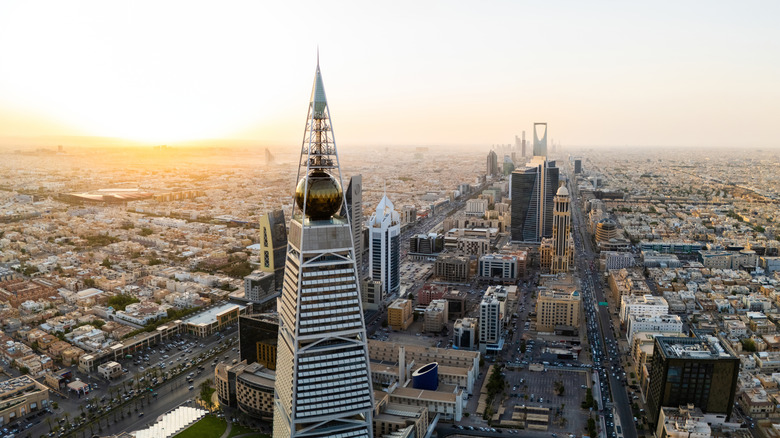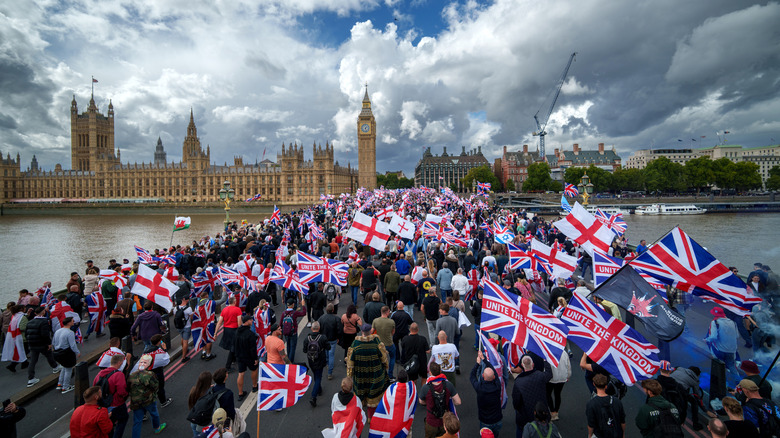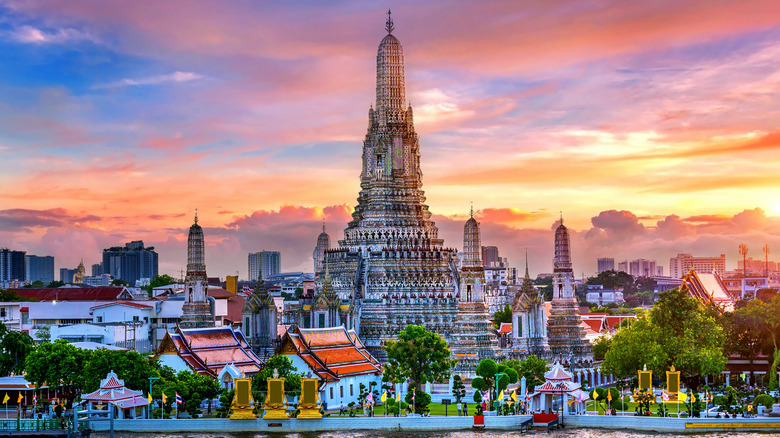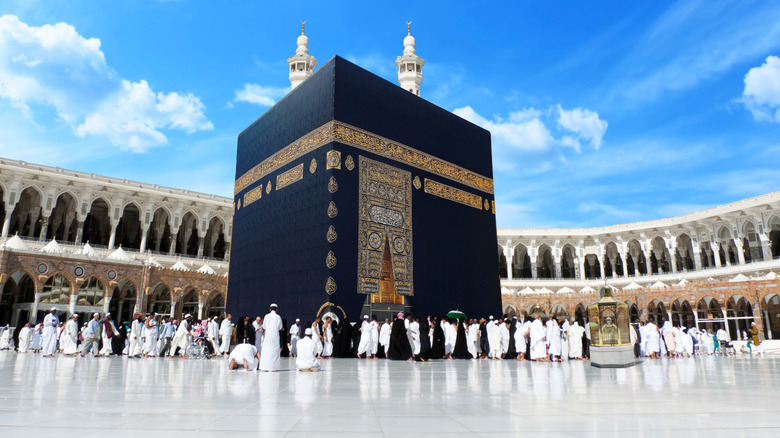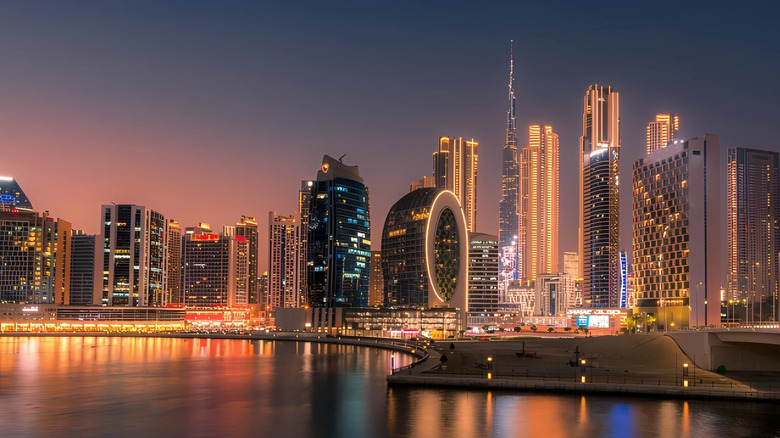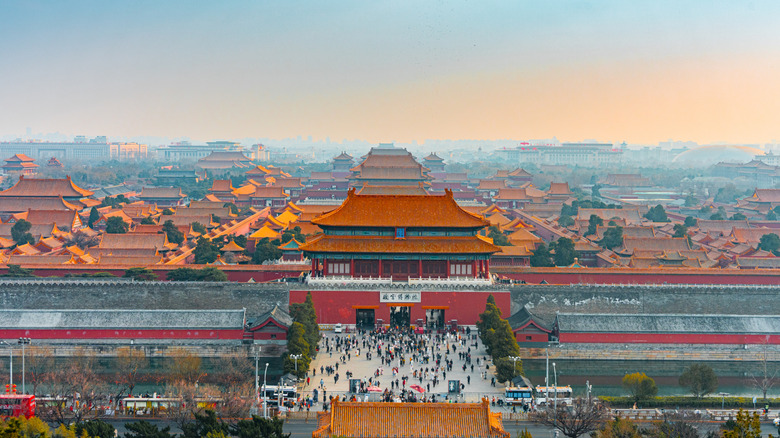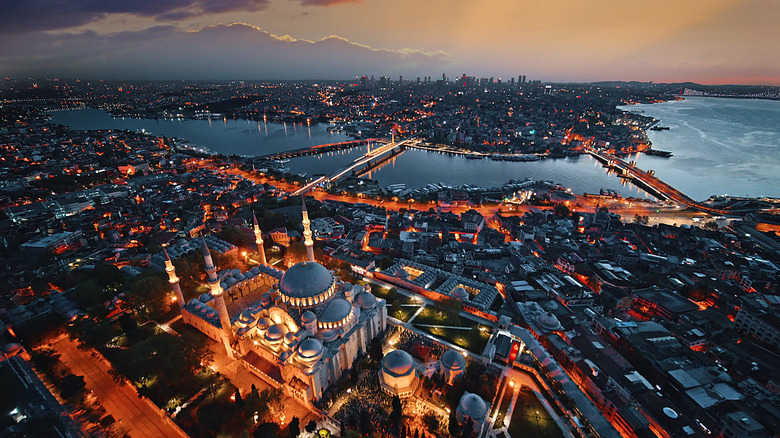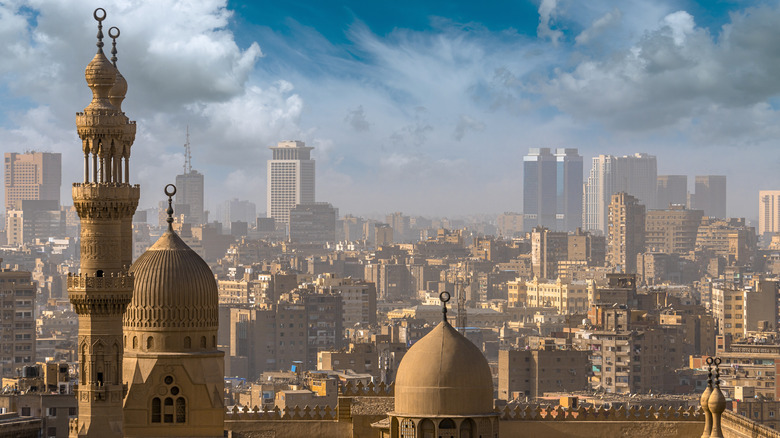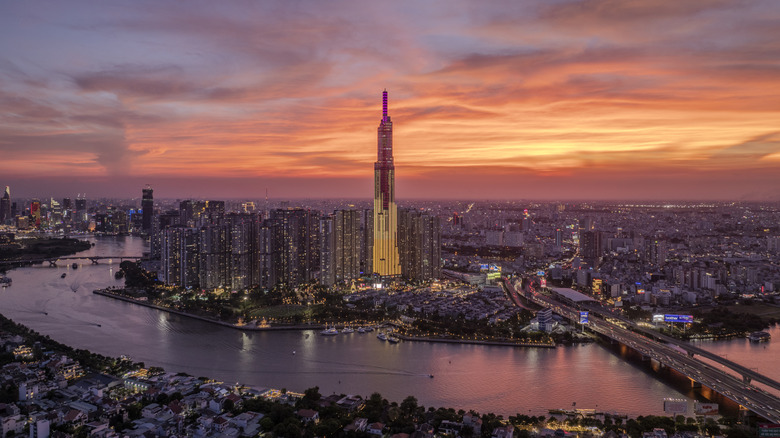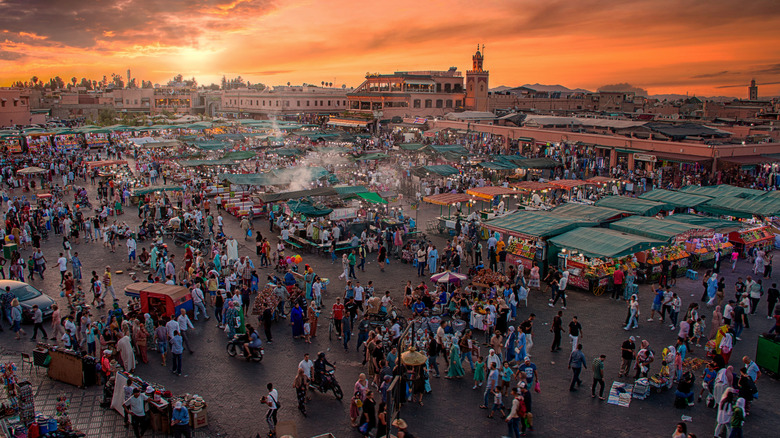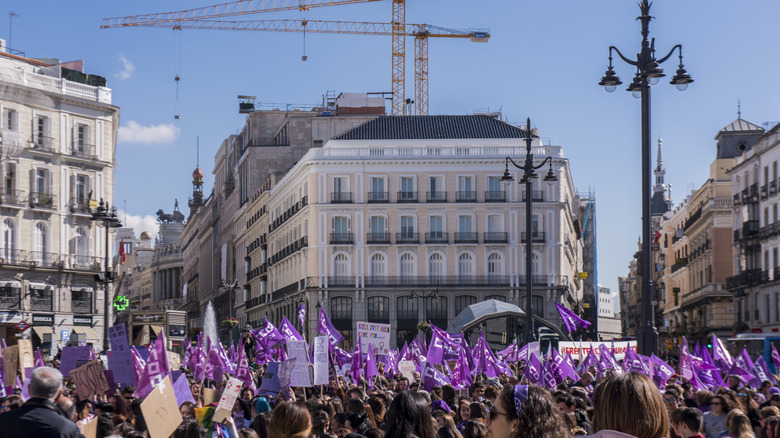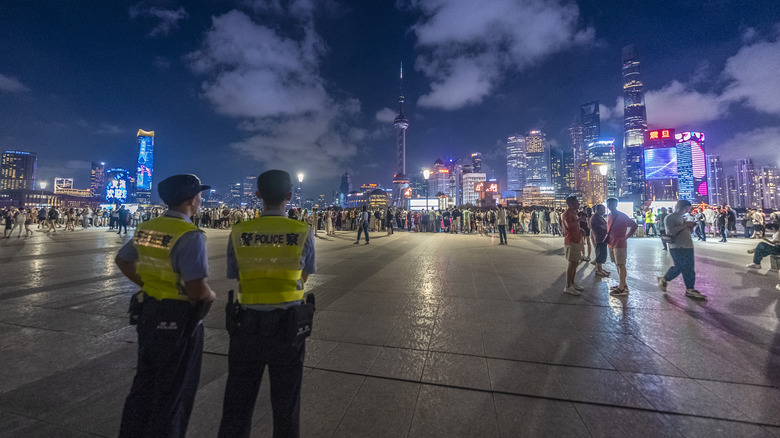Be Careful What You Say When Visiting These Countries (Insulting The Government Could Land You In Serious Trouble)
Free speech is something many of us take for granted in the Western world. The ability to criticize the government, royals, and other aspects of our country feels like a right (and it is), but it's also a privilege that was hard earned over centuries of political back and forth.
Other countries, even some that are wide open to tourists, don't observe the same traditions and can often punish those who choose to use their voice in dissent. Visitors to these countries are often unaware of these rules, or, if they are aware, don't quite grasp the severe implications of not following them. Even the U.S. is becoming stricter on what tourists can and can't post or write about before they arrive. It pays to always research the countries you're planning to visit, to ensure you're not doing anything to offend or place yourself in danger.
We've rounded up a list of countries with the most hostile rules on dissent, where that's insulting the government, criticizing the culture, or supporting a cause in opposition to the country's stance. Be careful what you say when visiting these countries: It could land you in serious trouble.
Why does understanding censorship matter?
If you live in a country like the U.S, France, Germany, Canada, or any with free expression built into its constitution, you may take it for granted. The ever-turbulent news cycle and apparent divisions we see in our societies are, regardless of how bad it may seem, evidence of the privilege we have to disagree with our government, individual leaders, and even each other.
Other countries across the globe have found themselves at a different point. Some of them, like China, Saudi Arabia, or the U.A.E., are successful and are, for all intents and purposes, relatively safe for tourists to visit, although they all have a Level Two travel advisory from the U.S. State Department, which calls for increased caution. But the safety we may feel there can be undermined by a lack of understanding of the system that these countries run on.
Taking the time to grasp the rules a country's citizens are bound by not only lends insight to your time there, but also protects you and lends nuance to any conversations you have with locals. Some may disagree with the rules and even risk their lives fighting them, while others believe in the leaders or parties that built those rules in the first place. That knowledge allows you to be a better traveler and understand more about a country than you would have without it.
Thailand and its regal protections
Thailand's presence on a list like this is often a surprise for tourists. The country is renowned as a backpacking and vacation haven, with countless dreamy beaches and coral gardens like those on Koh Lipe, the "Maldives Of Thailand," as well as Koh Samui and the Phi Phi islands. Even visiting its capital, Bangkok, would be considered one of the wildest nights out on the planet. In a place like this, freedom seems the norm, but the country has strict laws in place regarding its monarchy.
The rules, known as Lèse-majesté laws, make it a crime to insult the monarchy, and it's a thing some foreigners have been jailed for in the past. The rule states that Lèse-majesté is "a crime, insult, offence [sic] against the dignity of the King, the Queen, the Heir-apparent or the Regent, punishable with imprisonment of three to fifteen years pursuant to the Thailand Penal Code," via Thailand Law Online.
While many of the people prosecuted for breaking these rules are Thai activists, an American academic was arrested in early 2025 and held without bail for 54 days before fleeing the country (via NBC News). In the past, three Thai influencers were held for a TikTok video that supposedly made veiled insults at the Queen as reported by Business Insider. While it's unlikely you'll face any major issues in Thailand, it's worth avoiding any potential problems by avoiding the monarchy in day-to-day conversations and certainly not posting on social media.
Saudi Arabia is open to tourists, but closed to criticism
Saudi Arabia was once an untouchable country for tourists. But as the oil-rich nation begins diversifying its economy, it's positioning itself at the forefront of the travel world. Visitors are now flocking to the country to experience its cities, deserts, and dazzling historical sites. But while its door is wide open to tourists, its avenues for public dissent are still firmly shut.
Saudi nationals, as expected, face the brunt of the crackdowns, with peaceful online activists routinely being sentenced to anywhere from 10 to 45 years in prison. More shocking is the uptick in executions, with 198 people put to death in 2024, including some political dissidents, according to the European Centre for Democracy and Human Rights (ECDHR). At the time of writing, a British national is serving 10 years in a Saudi prison over a 2018 tweet regarding the Sudanese civil war (widely viewed as a proxy war between Saudi Arabia and the U.A.E.). He was arrested in front of his family while on vacation there (via The Independent).
Countries opening to the world can be very welcoming, but it's vital to remember that you're entering their country on their terms. And those terms mean you'll need to respectfully follow their rules and customs. It's especially important to keep this in mind with countries like Saudi Arabia. Its tourist market hasn't been around long enough for outsiders to fully grasp the way things work, and as it opens further, there could be growing pains.
The United Arab Emirates' strict free speech laws
Just across the Saudi border is the United Arab Emirates, or U.A.E., for short. The country has been welcoming visitors for decades and has recently relaxed rules around drinking and pre-marital cohabitation between a male and a female for visitors, which gives the impression of a more open society. It's famously one of the safest destinations on the planet, but some would argue that this is possible is the strict rules enforced by the government, including laws on free speech.
On paper, many of the rules look fair. Most were brought in to give the government some leverage in fighting extremism, but the loose verbiage opens the law to overreach. Multiple foreign tourists have been arrested in Dubai and beyond for seemingly harmless activities (via Christian Science Monitor). In 2014, a boy was detained for posting a video mocking teenagers' fashion sense in the city, while a more recent and absurd case saw an Irishman detained at the border over a Google review of a previous employer (via BBC).
Dubai is viewed by many as the city of the future. Luxurious lifestyles, propped up by low taxation and favorable business opportunities, have made it an amazing place to live and visit. But don't be fooled by the modernity; there are still strict rules in place that keep things running as the government wants them to.
China has some strict rules on and offline
Few would be surprised to see China appear on this list. The country, led by the Communist Party of China (CPC), boasts some of the most advanced cities on the planet, a spectacular public transport system, and what is now a thriving population with the largest middle class in the world. However, this prosperity does not mean that residents and tourists alike are free to do and say whatever they please.
Within its borders, you'll need a VPN to access sites like Google or Instagram, as well as any foreign streaming services, and its media is strictly controlled by the government. While it's an unbelievable country to visit, the control and oversight of the government, police, and military are evident everywhere, and tourists should not open themselves up to any potential issues while there. Don't take part in any organized political activities and avoid posting views of the country on social media, especially pertaining to the party's rule.
Generally, citizens face the brunt of any crackdowns on dissent, but foreigners are often detained for a multitude of reasons. The power of the government means it's easy for anyone to be held for crimes they may not have committed, or have smaller infringements escalated. Remember, it's the police's word against yours if something happens. As a nice rule, it's a good idea not to bring up the Chinese three "t"s — Tiananmen Square, Tibet, or Taiwan. You never know who you might upset.
Turkey's controversial leader
Turkey has emerged as one of the world's top tourist destinations in recent years. From the historical majesty of Istanbul to the tourist-friendly Mediterranean coastal town of Marmaris (and everything in between), it's a truly spectacular place to visit. But, under the surface, the country is wrought with political division and controlled by a leader who straddles the line between democracy and authoritarianism.
Since coming to power in 2014, Turkey's president, Recep Tayyip Erdoğan, has slowly tightened his grip on the country's press. Penal Code 299, a law criminalizing insults to the Turkish President, has been around since the '20s, but it was rarely enacted until Erdogan came into office (via BBC). Now thousands of citizens and foreigners have been charged under the law, despite mass calls for it to be repealed or at least amended. Erdogan and his supporters claim the use of the law is to fight corruption, but the decisions he's taken have drawn the ire of many international countries as well as free speech activist groups.
While tourist arrests are far less likely, partly viewed as a way to avoid any international dilemmas, it has happened in the past. A Moroccan visitor was arrested after being overheard criticizing the country, while a Canadian tourist faced a similar fate after an inflammatory Facebook post in 2017 (via Morocco World News).
Egypt's public relations machine
Egypt's jaw-dropping new Grand Egyptian Museum is finally (almost) open, adding to the country's already incomparable draws. But despite the millions of tourists flocking to the Pyramids of Giza, as well as the cities of Luxor and Aswan each year, it's not been without some serious issues. Its current leader, who led the coup d'état in 2013 that overthrew Mohamed Morsi, has remained in power through control of the military and the quashing of political opposition and dissenting voices.
Tourists are a protected commodity in the country, so it may be less likely that you come up against issues while there compared to other countries on the list, but there is a track record of tourists being in hot water. Back in 2018, a Lebanese woman was facing years in prison for posting a rant about her poor experiences in the country. According to the New Zealand Herald, she was arrested at Cairo airport for "deliberately spreading false rumours [sic] that are harmful to society and infringe upon religions." Once you leave the tourist trail following the Nile from Cairo down to Aswan, you'll occasionally stumble across military checkpoints, too. While most of them are just passport checks for security near the Libyan border, tour guides are quick to tell you to keep quiet, as the soldiers can be a little pushy and put you in awkward situations.
Less serious, but still indicative of the government's view on criticism, was the recent rebuttal of a points and miles journalist who criticized the running and cleanliness of Cairo airport (via The New York Times). In response, the Egyptian travel authority scanned through the journalist's movements in the airport, picking holes in his review and questioning his ethics. The journalist has already said he's not intending to head back any time soon and is a little spooked by the response.
Vietnam's one-party state
Vietnam is quickly turning into Southeast Asia's premier destination. Fusing a kaleidoscopic cultural experience with its fast-paced and quickly modernizing city life, it's a once-in-a-lifetime destination you don't want to miss out on. The country's wonders often blind visitors to the fact that it still operates as a one-party state, with a government run by the Communist Party of Vietnam that tightly controls any form of dissent.
As with Egypt, the country is heavily reliant on tourist arrivals, so there aren't too many cases of visitors being prosecuted. But, as one American Yale graduate experienced, taking part in anti-government protests can lead to jail time and deportation (via NBC News). Granted, he was actively involved with the march in question and didn't back down when challenged, but it's something to consider if you find yourself near any kind of public show of dissent. If you stumble into a protest or another event in countries with strict rules against dissent, consider the risks.
Countries with one-party state set-ups can be difficult to deal with if you end up in trouble. The police to administrative centers can be stacked against you at the drop of a hat. Even if there's not a huge track record of tourist arrests, it's important to be sensible in places like Vietnam, where Vietnamese YouTubers and online activists often face years in prison, according to the Times of India.
Morocco's monarchy is a no-go
Morocco is one of North Africa's most colorful countries, boasting everything from iconic cities like Marrakech and the Atlas Mountains to lesser-known surf towns like Taghazout, with its endless beaches and mountain views.
But while it's a popular, albeit sometimes frustrating, destination, it does have some laws looming over its people that could land you in trouble. Similar to Thailand, insulting the Moroccan monarchy is a punishable offense. Multiple locals have been sentenced in the past few years, some for multiple years at a time for a single video, while rappers and foreign journalists have both faced deportation and jail time for similar views on the local police.
Again, it's unlikely that a casual remark will land you in prison, but a conscious effort to criticize the monarchy or the government, or take part in any kind of political demonstration, is asking for deportation at best. It may be tough if you don't agree with the way things are done in countries like this, but if it's something you can't avoid being vocal about, you should consider giving them a miss.
Surprising gray areas and rarely enforced laws
Many of the countries listed here are probably of no surprise. One-party states, dictators, and military-backed governments often coincide media oppression, and, regardless of our personal opinions on it, the rules need to be respected for our own safety if we choose to visit these places. Some countries, however, could be featured on this list as major surprises. The only reason they don't feature is that they are mostly antiquated rules that are no longer enforced. Here are a few nations you wouldn't think had dissent-based rules.
Spain is widely regarded as a safe and free country, even by European standards. But its controversial and vaguely worded law, nicknamed the "gag law," has been used multiple times to arrest some activists for heavily criticizing the king or authority. It's not used often, but enough for public calls for it to be repealed. The U.K. has even come under fire in recent years, with some laws passed that are designed to repel hate speech. While the core of the legislation is intended to work for good, the vagueness in the bill leaves room for interpretation, with critics claiming it's a clamp on free speech. Toeing the line between true hate speech and dissenting opinions will continue to be a flashpoint in the U.K., and could be something to consider on a trip.
Poland has similar laws in place that technically ban insulting the President. While these have been rarely used or enforced for years, there have been a few cases of prosecution in "extreme cases," which some nationals are concerned about (via Notes from Poland). Even Sweden and Iceland still technically have similar rules that are rarely used.
Methodology
In building this article, we researched different laws around the world regarding slander or criticism of ruling parties or monarchs. Some, as should be apparent from the piece, enforce these strongly, while others are felt more by locals who oppose any given rule or law in regards to freedom of expression. Some are part of a broader system of rule, while others are tools that are intended to directly benefit the said country's current leader.
Each addition to the article was backed up with news reports from around the world as well as quotes from the country's official penal codes. None of the placements are here to be treated as criticism, and they are purely an attempt to tackle the issue from a travelers perspective and to encourage tourists to make safe choices when visiting these countries.
